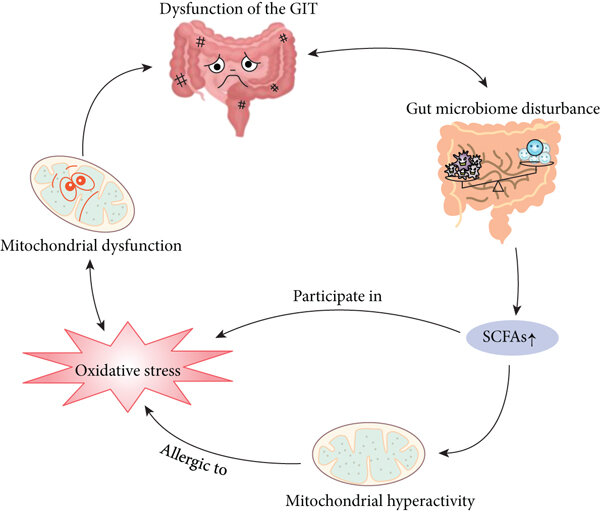The gut microbiome and mitochondria, both essential to human health, have a dynamic and significant interaction. Emerging research shows that gut microbial metabolites have a major impact on mitochondrial function, linking gut health to cellular energy production and systemic inflammation. Understanding this relationship is critical when developing novel therapies for a variety of disorders.
The Function of Mitochondria
Mitochondria are commonly known as the cell’s powerhouses. They produce adenosine triphosphate (ATP), the cell’s energy currency, by oxidative phosphorylation. Beyond energy production, mitochondria are engaged in a wide range of cellular functions such as cell cycle regulation, apoptosis, and the generation of reactive oxygen species (ROS). Given their vital function in cellular function, it’s obvious that mitochondrial dysfunction is correlated with a range of human pathologies, including metabolic disorders, neurodegenerative diseases, and cancer.
The gut microbiome is a complex ecosystem.
The gut microbiome is a complex colony of trillions of microorganisms that live in the gastrointestinal system. These microorganisms are critical for digestion, immune system modulation, as well as the production of important vitamins and neurotransmitters. The equilibrium of this microbial community is critical for gut health and general homeostasis.
Microbial Metabolism and Mitochondrial Function
The generation of microbial metabolites is one of the most important ways that the gut microbiome regulates mitochondrial function. Short-chain fatty acids (SCFAs) such as butyrate, propionate, and acetate are excellent examples. Anaerobic bacteria create SCFAs during the fermentation of dietary fibers, and they have a substantial impact on mitochondrial bioenergetics.
Butyrate is the predominant energy source for colonocytes, promoting mitochondrial β-oxidation. It boosts mitochondrial respiration, ATP generation, and biogenesis by activating pathways like AMPK and PGC-1α. Furthermore, butyrate has been proven to lower oxidative stress and inflammation by inhibiting histone deacetylases (HDACs), which improves mitochondrial performance and cell homeostasis.
Propionate and acetate also promote mitochondrial health. Propionate has been demonstrated to stimulate mitochondrial biogenesis via activating extracellular signal-regulated kinase 1/2 (ERK1/2) pathways, whereas acetate promotes mitochondrial respiration and reduces oxidative stress.
Pathogen-associated Molecular Patterns (PAMPs) and Innate Immunity
PAMPs (pathogen-associated molecular patterns), such as lipopolysaccharides (LPS) found in bacterial cell walls, can cross the intestinal barrier and affect mitochondrial function. PAMPs activate pattern recognition receptors (PRRs), such as Toll-like receptors (TLRs), on host cells, resulting in innate immune responses. This activation can lead to an increase in mitochondrial ROS generation, which activates the NLRP3 inflammasome. This causes the release of inflammatory cytokines, which link microbial signals to mitochondrial-mediated inflammation.
It triggers the release of inflammatory cytokines, which link microbial signals to mitochondrial-mediated inflammation.
LPS, in particular, has been observed to stimulate mitochondrial fission, increase ROS generation, and inhibit PTEN-induced kinase 1 (PINK1)-mediated mitophagy, resulting in an accumulation of damaged mitochondria and inflammation.
Gut Microbiota and Mitochondria in Neurodegenerative Diseases
Emerging research has shown that the gut microbiome has a role in neurodegenerative illnesses by influencing mitochondrial activity. For example, gut bacteria’s synthesis of SCFAs has been related to modulation of microglia activity in the brain. Butyrate, for example, can pass the blood-brain barrier to improve mitochondrial performance in neuronal cells, thereby lowering neuroinflammation and oxidative stress.
Mitochondrial dysfunction and altered gut microbiota composition are typical features of Alzheimer’s and Parkinson’s disorders. Butyrate-producing bacteria have been demonstrated in studies to be underrepresented in patients with these disorders. Butyrate’s capacity to enhance mitochondrial biogenesis while decreasing oxidative stress suggests that restoring a healthy gut flora could be a therapeutic strategy.
A Bidirectional Relationship
The connection between the gut microbiome and mitochondria is bidirectional. While microbial metabolites impact mitochondrial function, mitochondrial health can also have an impact on the gut microbiota composition. For example, a high-fat diet can impair mitochondrial function in gut epithelial cells, resulting in a dysbiotic proliferation of potentially dangerous bacteria. Conversely, dietary therapies that promote mitochondrial biogenesis can aid in the maintenance of a healthy gut microbiome.
Finally, the complex relationship of the gut microbiota and mitochondria demonstrates the complexity and interdependence of our biological systems. Microbial metabolites, such as short-chain fatty acids, play an important role in mitochondrial function, impacting everything from energy production to inflammation management. This bidirectional association not only emphasizes the significance of maintaining a balanced gut microbiota for good mitochondrial function, but it also opens up new therapeutic options for a variety of disorders. As we learn more about this connection, it becomes clear that caring for our gut microbiota is critical to maintaining cellular vitality and overall well-being.
EXPLORE AND READ FURTHER :
The Crosstalk between Microbiome and Mitochondrial Homeostasis in Neurodegeneration : https://tinyurl.com/5dnfjphu
Microbiota and mitochondria: Impact on cell signaling, physiology, and disease : https://tinyurl.com/mvw7dxb9
Interactions Between Intestinal Microbiota and Neural Mitochondria: A New Perspective on Communicating Pathway From Gut to Brain : https://tinyurl.com/2xkkwczx
Talk to Me—Interplay between Mitochondria and Microbiota in Aging : https://tinyurl.com/hv6n96rb
Host mitochondria influence gut microbiome diversity: A role for ROS : https://tinyurl.com/f3b5zh69
